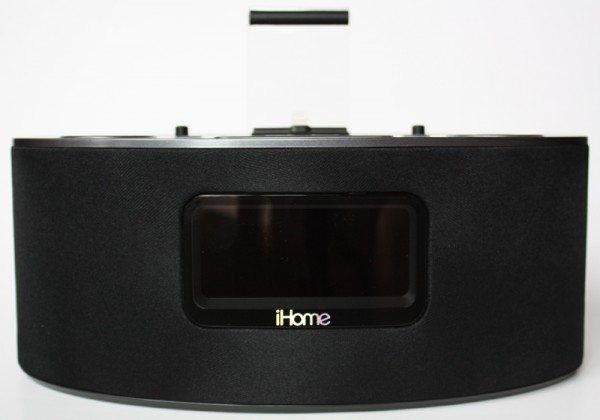
I’ve had my iHome docking alarm clock since the 3nd generation iPod Touch came out. I enjoyed the easy interface that iHome brought, and that it worked with my iPhone when I got one. Sadly, when they upgraded to the Lightning connector the dock no longer worked with my phone, but I had grown so accustomed to the alarm clock, that I never bothered to replace it. When the iHome iDL46 Dual Charging Stereo FM Clock Radio with Lightning Dock and USB Charge/Play was offered to review, I jumped at the chance to update my old alarm clock. Not only did it have a Lightning dock, but it also allows for a USB and auxiliary input, which means if they ever change the connector, I can still use it.
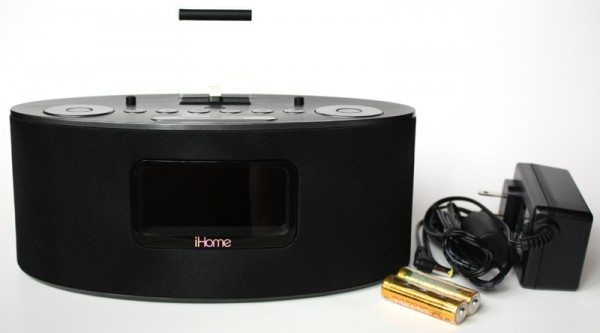
The first thing I noticed when taking the alarm clock out of the box was its size. With its dimensions as 9.26″ wide by 6.11″ high, it is definitely a lot bigger than my current clock. It also weighs a hefty, but sturdy 2.53 lbs. The only other items in the box were an instruction manual, a set of batteries, and a power adapter. I was happy to see that they hadn’t changed the plug from my old clock, so if my cats ever chews up this cord, I will have a backup.
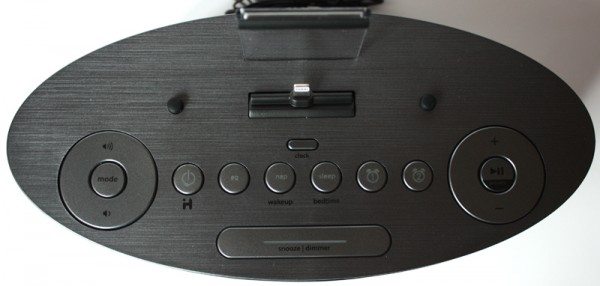
On the top of the alarm clock you’ll find all the buttons and the Lightning dock. The two small rubber dots are for when docking an iPad. Placing the iPhone and iPad, both case-free, on the dock was simple enough and both devices were recognized and started charging right away. If you have an iPhone case that does not work well with the bigger charging cables, then you may have the same problem here. With my iPad, I was able to just barely get it docked in the case, but it was not firmly seated, so I would not have trusted it.
The buttons are all clearly marked and also are illuminated to whatever brightness you have the front display set to. If you have your iPhone/iPad docked and press the clock button, it will auto sync the time on the clock to your phone, which made setting up this alarm clock by far the easiest out of any I’ve had. The buttons are, from left to right, as follows: volume up/down and mode, power, equalizer, nap, clock, sleep, alarm one, alarm two, and the back/forward and play/pause button. The big bottom button is, as in most alarm clocks, the snooze button that also functions as the dimmer button. To set one of the alarms you just need to hold down which alarm you want, choose your time and wake up type (buzzer, radio, docked device), and then press the button until it beeps. The front display will then say what time the alarm is set for until the alarm is turned off. To turn off the alarm, you just press the alarm button corresponding with which of the two alarms you chose. I always use the alarm two button, since it’s the easiest to feel out when half asleep.
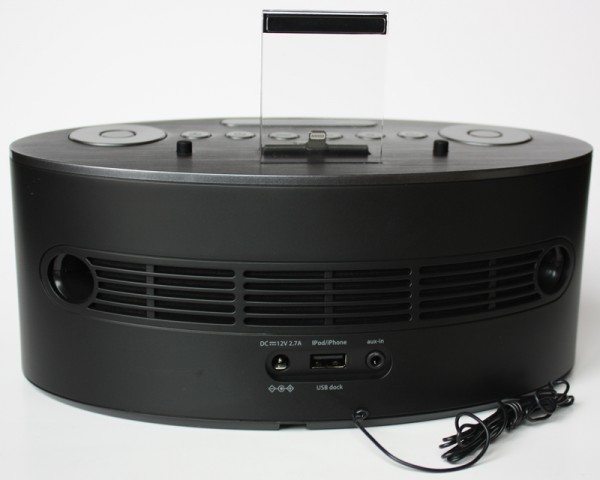
On the back of the alarm clock, you have your power input, a USB port, an aux-in port, and a radio antenna. All of my stations came in just fine without uncoiling the antenna, so it’s tucked behind the clock until it may be needed. The aux-in works the same as every other 3.5mm port, and while of course it won’t charge, it will let you use the speakers on the alarm clock for sound. The iPod/iPhone USB dock port is an alternative to the top dock. When my iPhone was plugged in, it recognized it just as if it was the top dock and played my music with no problem. Even though it says iPhone/iPod above the USB port, I tried out an Android device to see if it would work. The sound would not work, but the tablet did start to charge.
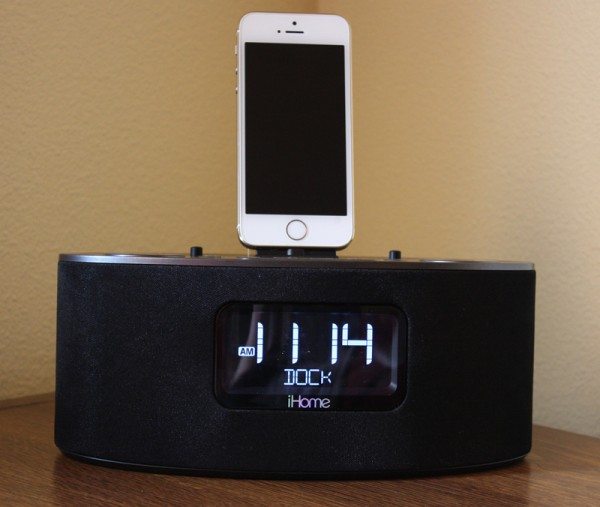
The sound quality of the speakers on this dock impressed me quite a bit. Given its price tag, they should be good. The sounds come out clear and there is even a little (non thumping) bass. When you have a phone docked and are playing music, the front display will say dock. To switch between dock to radio or aux-in, you just press the mode button. The front display has several brightness levels, but the lowest setting is still quite bright to me in a dark room.
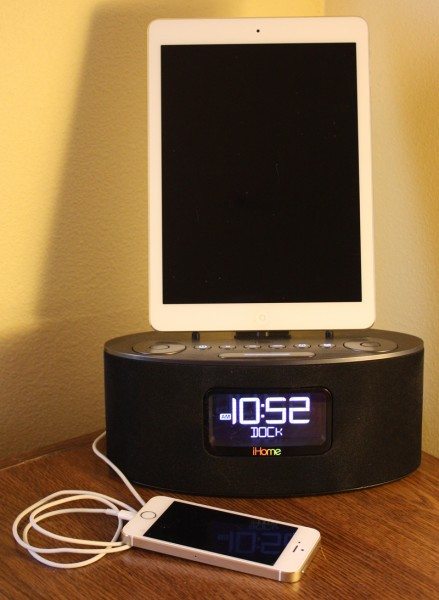
You can barely see the top buttons illuminated on the above picture, but I have the brightness settings set to maximum. Also noticeable is the size of the clock compared to the iPad Air. When I had music playing on the USB dock, and plugged in the top dock, it would pause the music until the top dock started charging, which lasted a few seconds. Not a big deal, but something I noticed. Otherwise, using the dock and stereo portion of the alarm clock was simple and painless.
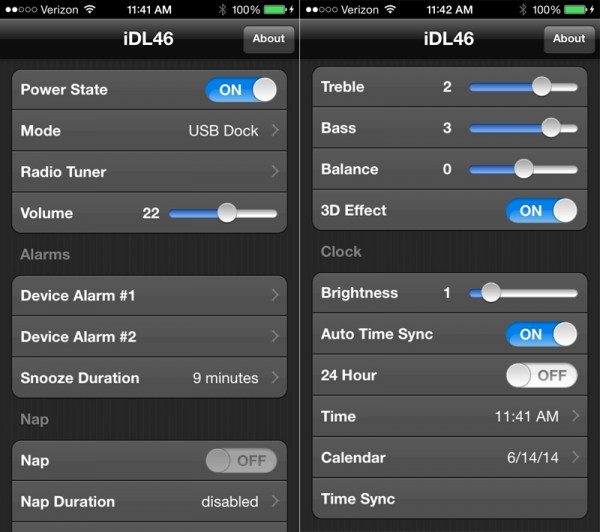
When I first docked my phone, a message came up saying that I could download a few apps that work alongside of the alarm clock. I downloaded the iHome Set app, and immediately was pleased. With this app, you can do everything that the buttons on the alarm clock itself does. This made it so easy to set my alarms and customize the equalizer. You can also use the app to update the firmware on the clock.
Overall, I am very happy with the iHome iDL46 alarm clock. Other than the brightness of the display, I have little to fault it for. With its very good sound quality, iHome Set app, and the dual docking capabilities, I think the price tag is reasonable and would recommend it to someone who is looking for an alarm clock with a Lightning dock and good sound.
Visit http://www.ihomeaudio.com/ for more info about the iHome iDL46 alarm clock.
ESR for MagSafe Wallet, 5-Card Holder With RFID Blocking, MagSafe Sticker Included, Slim Magnetic Wallet for iPhone 17e/17/16/15/14/13/12 Series and Selected Samsung Devices, Not for 13/12 Mini, Black
(as of March 4, 2026 12:45 GMT -06:00 - More infoProduct prices and availability are accurate as of the date/time indicated and are subject to change. Any price and availability information displayed on [relevant Amazon Site(s), as applicable] at the time of purchase will apply to the purchase of this product.)KRTALS Magnetic Wallet Cell Phone Card Holder for Phone Case, Stronger Magnetic RFID Leather Phone Wallet Stick on Series of iPhone 17/16/15/14/13/12 and Pro/Promax, Light Pink
(as of March 4, 2026 19:40 GMT -06:00 - More infoProduct prices and availability are accurate as of the date/time indicated and are subject to change. Any price and availability information displayed on [relevant Amazon Site(s), as applicable] at the time of purchase will apply to the purchase of this product.)Product Information
| Price: | $99.99 |
| Manufacturer: | iHome |
| Pros: |
|
| Cons: |
|



Gadgeteer Comment Policy - Please read before commenting
Will it take an iPad mini in the top dock?
As long as it is the iPad Mini with the Lightning port, it will work.